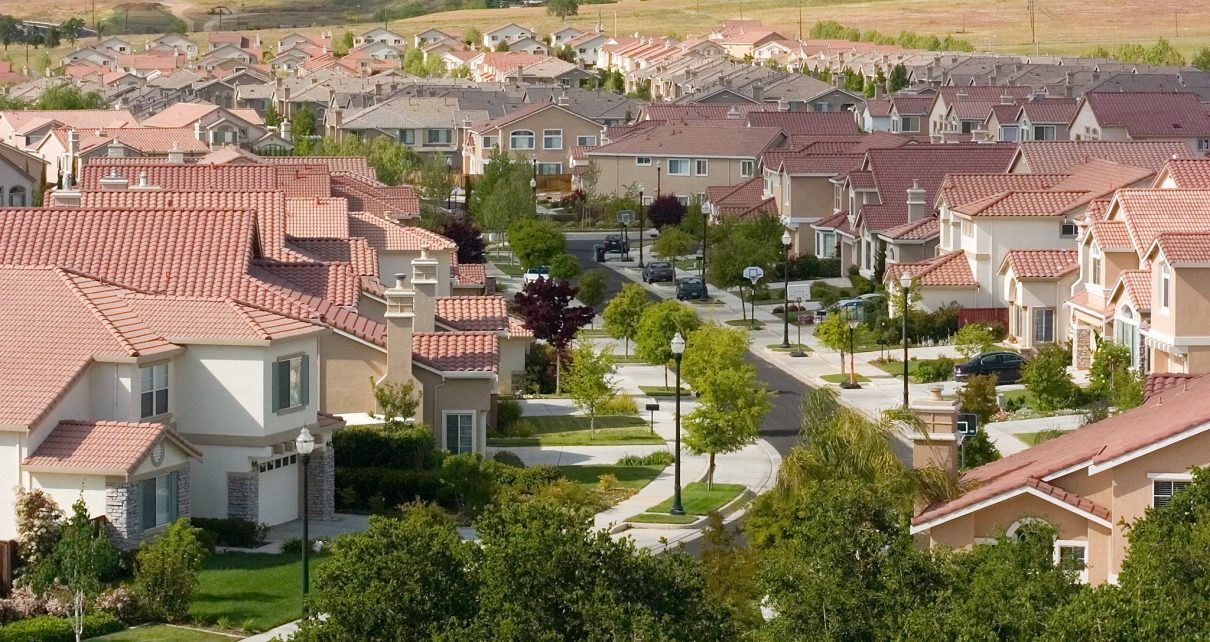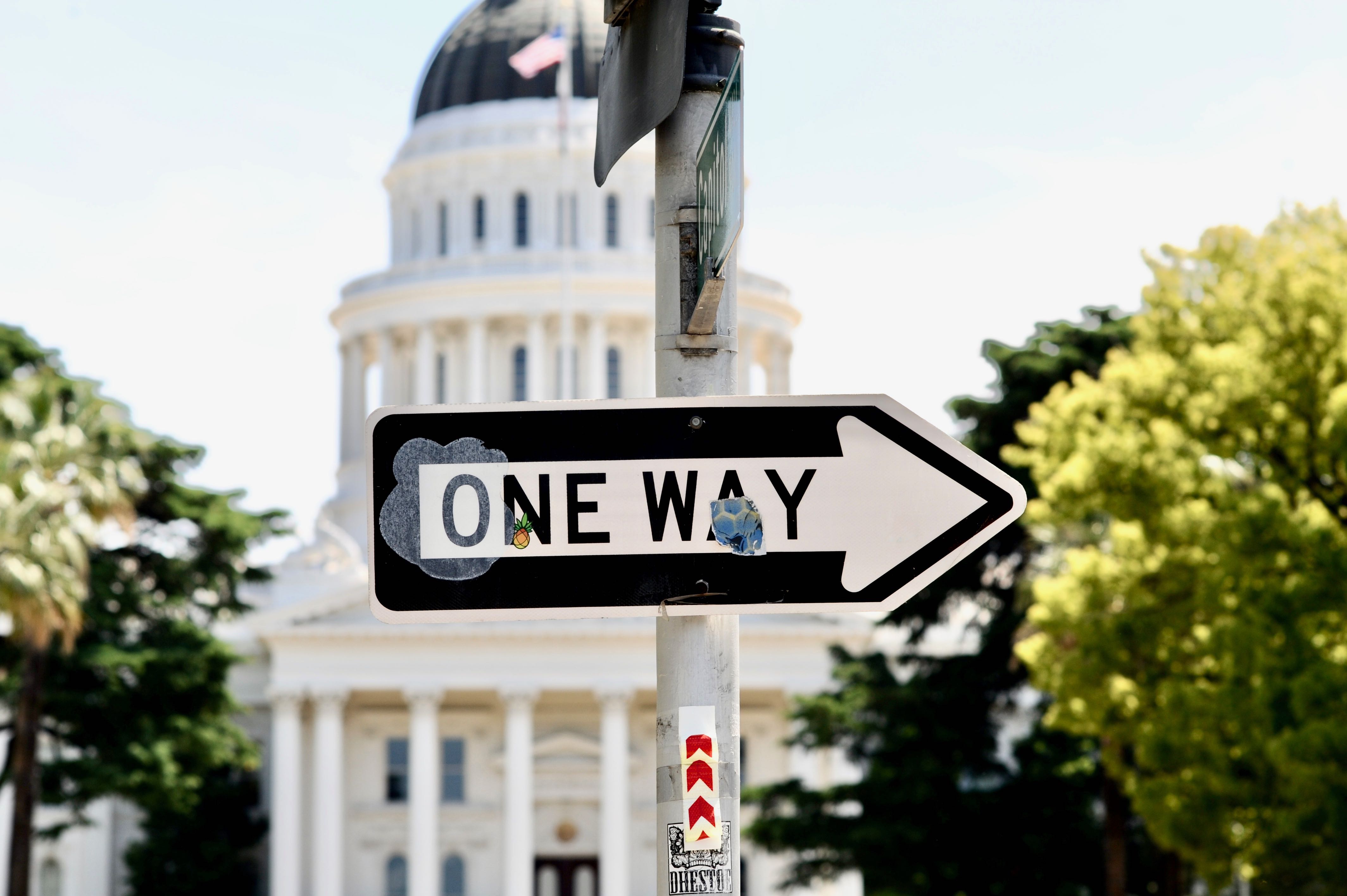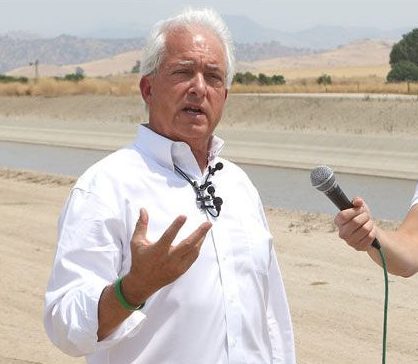
Tract housing, San Jose, CA. (Photo: Wikipedia)
CA Dems are in Trouble with ‘Home-Value-Voters’ with Upcoming November Election
Democrats may have shot themselves in the foot with overkill clamp downs on businesses and travel
By Wayne Lusvardi, April 28, 2020 6:51 am
The longer Gov. Newsom prolongs the period for medically unnecessary martial law the greater the likelihood that home-value-voters will come out to the polls against the split roll property tax.
The Democrat Party in California is in trouble with home-value-voters in the upcoming national election in November 2020 if property values plummet or sales stall as a result of their policy to shut down the economy rather than deploy a triage strategy to the Corona-virus panic.
California is home of the famous terms “Proposition 13 taxpayer revolt”, “NIMBY’s” (not-in-my-back yard) and “third rail” (touch the electrified rail, you lose the election). In his book The Homevoter Hypothesis: How Home Values Influence Local Government Taxation, School Finance and Land Use Policy, economist William A. Fischel called the relationship between voting and property taxes as the “homevoter hypothesis”. This means that voters are primarily motivated by one thing – protecting and enhancing the value of their largest asset, their homes.
With this in mind, the controlling Democrat Party in California could be in trouble in the upcoming national election in November 2020 if property values plummet or sales stall as a result of their policy to shut down the economy rather than deploy a triage strategy to the Corona-virus panic.
A hint of this prospect was the voter rejection of the intentionally confusingly-numbered “Proposition 13” of 2020 – the Public Preschool, K-12 and College Health and Safety Bond Act that was recently voted down by 53 to 47 percent on March 3, 2020. Prop. 13 of 2020 would have allowed local school districts to issue bonds for school facilities that would have ended up as a special supplemental tax on property tax bills.
Will There Be Another Housing Crash?
According to the website for the National Association of Realtors, we are not likely to see a downturn in home prices, fire sale prices or a long stall in the home sales market after Coronavirus martial law is lifted.
“There’s no way we get through this unscathed. But I don’t think the world will fall apart in the housing market the way it did in the last recession,” says realtor.com®’s chief economist, Danielle Hale. “We won’t see prices driven down out of necessity because people were forced to sell like before.”
Hale points out there is no oversupply of housing, cheap mortgages, loose loan qualification requirements or mortgage bonds sold to duped foreign investors as there were in the housing crash of 2008 to 2012. Today there is a housing shortage and loan qualification standards have not been relaxed. But loan and rent payments are likely to fall.
As Hale states, “The biggest wildcards in this current mess are just how long it takes to get the virus under control—and then how quickly the economy takes to bounce back. About 22 million people, or 13% of the U.S. workforce, filed for unemployment in a month’s time. Experts predict unemployment could rise to 15% or even 20% before the pain subsides.”
It will be difficult to tell if there is a housing price crash underway after martial law is lifted because the first stage of a price collapse is “denial” when people hold out for former home prices until reality sets in (see chart here).
However, Hale went on to say “we aren’t going to get through this recession without any challenges for the housing market,” such as a wave of foreclosures. And foreclosures tend to drag prices of nearby homes down especially if there are no other comparable sales than foreclosure sales.
Where foreclosures could increase significantly is with Small Business Administration (SBA) loans where real estate is the collateral for the loan. Small businesses make up 99.8 percent of all businesses and about 49 percent of all employees in California.
Will Split-Roll Commercial Property Tax Fail at Ballot Box?
On the November ballot is the proposed Split-Roll commercial property tax – titled the California Tax on Commercial and Industrial Properties for Education and Local Government Initiative.
A split tax roll means the property tax list is split into residential and commercial taxpayers.
The proposed tax would not apply to homes or small businesses but to properties of large corporations with 500 or more employees (such as retail malls, Walmart, Home Depot, Costco, large office towers, amusement parks, oil fields, oil refineries and even large farming operations).
However, most of the commercial properties to be taxed are ones that “little-guy” customers shop at, such as Taco Bell, Ross Stores, Chevron gas stations, IHOP, Petco, McDonalds, 99 Cent Store, Popeyes Chicken, etc. Will home-value-voters and renters realize that the so-called split roll property tax is just a disguised sales tax on Big Businesses that will be just passed through to customers in the prices of products they sell?
This sales tax is advertised as a property tax. It will increase commercial property taxes by shifting onto commercial customers $771 per household per year in California ($10 billion/12,965,435 households). That is $771 per year that cannot go into paying the mortgage, insurance, upkeep or upgrades on a home as a family’s most valuable asset. And it won’t help pay the landlord any back rent that could lead to loan defaults and foreclosures. Businesses like those listed above are not eligible to get Federal Corona-virus relief.
The longer Gov. Newsom prolongs the period for medically unnecessary martial law the greater the likelihood that home-value-voters will come out to the polls against the split roll property tax.
Democrats may have shot themselves in the foot with overkill clamp downs on businesses and travel to fight a bogeyman corona virus where 95 percent or more of its victims are the already sick elderly. Thus, there is no Corona-virus crisis necessitating killing off the economy…and possibly home values.
- Peter Gleick’s National Water Plan for California - October 12, 2020
- Court Opens Up Big Prop.13 Loophole for ‘Public Franchise Fees’ - October 2, 2020
- New Cal Grid CEO is Ex-Enron Green Power Trader - September 29, 2020





We can only hope that Californians wake up to the fact that the Dimms just want to control everyone and everything and we all suffer under that kind of control. Voting for ANY Dimm is voting for the further destruction of California.
Appreciated this rather positive and reassuring angle on likely home-owning voter reaction to the CV-19 shutdown. In this case that if one’s hard-earned precious property and greatest individual asset should take a hit because of the extended CV-19 clampdown, that homeowners’ losses will galvanize a vote against Democrats who did this to them unnecessarily. Interesting.
In addition there are some thought-provoking specific points that I’m sure many people had not considered, such as the split-roll on the Nov. ballot’s effect on the price of, e.g., Taco Bell tacos and the stuff you buy at Petco and how those prices will be forced to go way up if the darn split-roll passes. Or maybe some of the satellite stores will not survive?
Good to know from this too that although there will be some foreclosures, there will likely not be the kind of devastation in real estate of the magnitude that many fear.
Also very much liked the coining of the phrase “Coronavirus Martial Law.” That’s it!
Nashville Mayor Proposes 32% property tax increase -HEADLINE
Newsom has done a great job of ruining California.
Of course, he has not completed his political agenda yet.
So, why would he want to reopen?
The dims should be swept away on a red tidal wave in November.